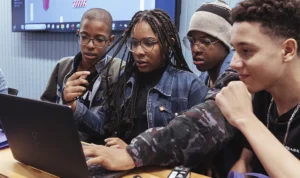The teacher Débora Garofalo gained notoriety for seeing, even in trash, an opportunity for new learning. With her project “Robotics with Scrap”, she used discarded objects to teach electronics, robotics and many other curricular contents to children and young people from the outskirts of São Paulo.
The initiative was so successful that it became public policy in the State of São Paulo, reaching 3.7 million students. “Garbage was a real problem in their lives,” says Débora, current coordinator of the Paulista Basic Education Innovation Center. “When faced with a problem, we brought solutions to study. Using everyday examples also means giving new meaning to education.”
In an interview with iFood News, she explains how educators can give new meaning to school and bring technology to give young people more prominence in the classroom.
iFN – What are the biggest challenges facing public education today?
Deborah – Today, the biggest challenge is addressing mental health. We have data that shows that students are having anxiety attacks. Out of every ten young people, six go through this. We are very concerned about restoring learning after the Covid-19 pandemic. But this won't be possible if we don't stop and start with the basics, which is taking care of our children and making the school welcoming.
We also need to give new meaning to education. We talk a lot about new approaches, active methodologies, culture maker, technology, robotics, programming, but we forget to look at comprehensive education, which is an essential pillar.
It is necessary to train teachers for this, as we are not prepared to deal with these new approaches. We need to take advantage of the inputs we have and weave new paths for an education that makes sense for our students.
iFN – What would this redefinition of education be?
Deborah – Education has already gone through several revolutions. Each one brought a mark to its evolution, and it wasn’t just in infrastructure. We went from a technical, repetitive education, which needed training for an industry, until we reached education 4.0, which brings all these technologies, and 5.0, which seeks to humanize all of this.
Giving new meaning to school means bringing out this human side. School is much more than a place of knowledge. I myself was trained as a teacher to exercise my autonomy in the classroom. And today the greatest autonomy I see is being able to deal with people, with their feelings and values in the room.
Knowledge is also built through human relationships. It is necessary to have a school that talks about a life project, that promotes the experience and the opportunity to put learning into practice.
Among the ten teaching skills of the new high school, for example, we have to work on self-management, self-care, aesthetic sense, digital culture. Reframing education means being able to take all these aspects of the BNCC [National Common Curricular Base] and put it into practice.
iFN – Today students no longer depend solely on the teacher, many have their cell phones in class. Does technology help to form young people with a more critical spirit?
Deborah – Technology is a great driver of learning, but we still need to demystify it. People think they need to have a technological device and that's not it. Social technology is much bigger. Taking advantage of the fact that students are connected gives the teacher the opportunity to be a learner.
As a learner, the teacher is in a situation where he will not know everything. But it takes the first steps so that students can walk.
Mediating knowledge is my role today. It is no longer about being the transmitter of knowledge, but rather about placing students at the center of learning. They are the focus, not me. But this role reversal is not yet very clear, we were not trained for this.
Today, students bring knowledge and we, teachers, need to work with this information. The access is there; The teacher's role is to work on values, teach if the information comes from a reliable source.
iFN – Is technology bringing protagonism to children and teenagers?
Deborah – I don't think so yet. We are moving towards this. Students have the opportunity to be producers, not just consumers. The problem is that we are encouraging the use of technology too early, without a pedagogical purpose.
At home, many parents give a cell phone, a game, to distract and calm the child. That doesn't have a purpose. I think the school has the role of guiding this orientation so that students are not just consumers, but producers of technology. And it has the role of raising awareness among the family, of helping to set limits.
Technology will only be a driver of learning if we can make activities meaningful for these children. It's a process that takes work, it's not easy.
iFN – You already said that a transformative education is not just an adaptation of the curriculum, but a cultural change. What does that mean?
Deborah – I always say that it is a cultural transformation because people are very immediate and think they will solve the education problem quickly. We have to stop wanting to solve education problems immediately and actually create processes that are lasting.
People should expect cultural changes. Initially, it is the teachers who provide students with information and provide paths. Over time, these students understand where they can research, and this is a cultural transformation.
With the new high school, it is the first time in history that we are talking about a life project, and not just preparing for the entrance exam. You can choose the areas with which you have the most affinity to study. But it is still too early to know what the results of this will be. Transformation takes time.
iFN – Do you think technology can make education more inclusive?
Deborah – Totally. But technology will not do this alone, so it must be accompanied by new methodologies, such as the STEAM approach [acronym, in English, for science, technology, engineering, arts and mathematics], for example, which is investigative, based on the curriculum .
I see an opportunity where there is a student full of knowledge, wanting to research, bringing information. It’s time to personalize our classes and give students a voice. Teachers should not think that cell phones interfere with class, but rather see cell phones as a powerful tool for personalizing teaching.
I really believe in the potential of active technologies, of hybrid teaching. One thing I always say is: adapt the rule. Understand how students learn. There are students who do not learn by listening, but by experiencing.
iFN – What is your big dream for education?
Deborah – I dream of a truly humanizing education, of a school that is welcoming and provides challenges. Where our young people feel well-being. I know we are still heading towards this, but I dream of quality and equitable education. May we be able to integrate differences and no longer have racism. The school needs to give these young people the opportunity to transform society.
Are you interested in the subject? Also find out how technology can boost business


